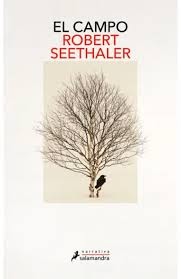
Original Language: German
Títutulus original: The field
Translation: Ana Guelbenzu
Year of publication: 2024
Valoración: Recommended
Harry Stevens, a German old man resident in the town of Paulstadt, enjoys walking every afternoon between the graveyard tombs, a place where the neighbors call “the countryside”, the days that has long been. When he gets tired, he sits in the shadow of an old birch, and lets his thoughts wander. Sometimes, he thinks he can hear the dead, although he does not capture more than loose words, and wonders what the object of his conversations will be. Many knows them or, rather, he met them. They were workers, merchants, dependents and politicians of the people who, surely, have many things to tell us about their life and, of course, about their death.
Perhaps only at that last moment, as our protagonist says “It would be reasonable for a human being to issue a definitive judgment on his life.”
And that is what Seethaler does in this book. Give the word to twenty -nine neighbors from Paulstadt who tell us how they lived and how they died. It is a small and closed universe and, in many occasions, inevitably, the stories of some characters are intertwined with those of others creating a universe in which we see how the entire community breathes. There are stories of love, hate, loneliness, hope, revenge, illusion or cruelty. Each chapter does not cease to be more than a reflection of the human condition.
Seethaler is proposed, and gets it, that we understand each of the characters he presents. They are normal and currents characters, such as you and me, with your little joys and sorrows, who make decisions, successful or wrong, who direct your life, often already your death, in a certain direction.
I do not resist incorporating the final fragment of a chapter. Illustrative lines of the poetic tone in which the German writer moves:
“In my memory I no longer stopped raining, the world collapsed. Now I yAz here, among my parents. It has not been a long path, but it is calm, and some nights I hear in the distance a moan, slight at first, although constant as the cry of a child, which then grows and becomes more intense and penetrating, until the night is filled. interrupts ”.
Seethaler writes with elegance and sobriety and transmits tenderness to the characters he portrays. Some deserve some lines, several other pages, but all have constituted Paulstadt’s living fabric and everyone has things to tell us.
As the German novelist himself pointed out in an interview: “Every man is the hero of his own story.”
Signed: José Miguel Martínez
Also by Robert Seethaler reviewed in Ulad:
Source: https://unlibroaldia.blogspot.com/2025/06/colaboracion-el-campo-de-robert.html


